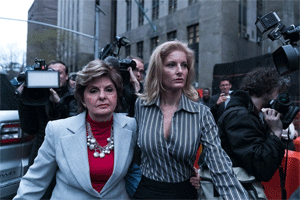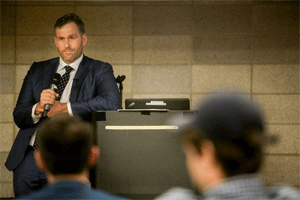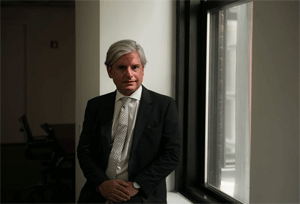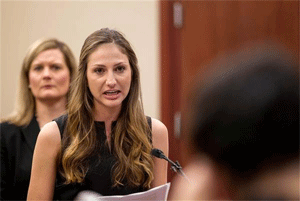by Kenneth P. Vogel
December 31, 2017
NOTICE: THIS WORK MAY BE PROTECTED BY COPYRIGHT
YOU ARE REQUIRED TO READ THE COPYRIGHT NOTICE AT THIS LINK BEFORE YOU READ THE FOLLOWING WORK, THAT IS AVAILABLE SOLELY FOR PRIVATE STUDY, SCHOLARSHIP OR RESEARCH PURSUANT TO 17 U.S.C. SECTION 107 AND 108. IN THE EVENT THAT THE LIBRARY DETERMINES THAT UNLAWFUL COPYING OF THIS WORK HAS OCCURRED, THE LIBRARY HAS THE RIGHT TO BLOCK THE I.P. ADDRESS AT WHICH THE UNLAWFUL COPYING APPEARED TO HAVE OCCURRED. THANK YOU FOR RESPECTING THE RIGHTS OF COPYRIGHT OWNERS.

Gloria Allred, left, a high-profile women’s rights lawyer and Democratic donor, is raising money to fund a lawsuit against President Trump by Summer Zervos, right, who has said he sexually assaulted her. Credit Jeenah Moon for The New York Times
WASHINGTON — As the #MeToo movement to expose sexual harassment roils the nation’s capital, political partisans are exploiting the moment, raising hundreds of thousands of dollars to support accusers who come forward with charges against President Trump and members of Congress, even amid questions about their motivation.
As accusations take on a partisan tint, activists and lawyers fear that such an evolution could damage a movement that has shaken Hollywood, Silicon Valley, media suites in New York and the hallways of Congress — and has taken down both a Democratic fund-raiser, Harvey Weinstein, and a conservative stalwart, Bill O’Reilly.
“There is a danger in this environment that unsophisticated individuals who have been abused by powerful people could be exploited by groups seeking partisan advantage, or by lawyers seeking a moment in the limelight,” said Debra Katz, a Washington lawyer who has brought sexual harassment cases against politicians from both parties.
The lawyers and operatives behind the most politically charged cases brush off those concerns.
“I approach this with a pure heart,” said Jack Burkman, a flamboyant Republican lawyer known for right-wing conspiracy theories who is seeking to represent sexual harassment victims. “I don’t want to see it politicized, even though, in a democracy, you see the political weaponization of everything.”
Gloria Allred, a high-profile women’s rights lawyer and Democratic donor, is raising money to fund a lawsuit against Mr. Trump by a woman who says he sexually assaulted her. The woman, Summer Zervos, has filed a defamation suit against the president that could force Mr. Trump to respond to sexual misconduct accusations made in the closing weeks of the campaign by a raft of women.
And a nonprofit group founded by the Democratic activist David Brock, which people familiar with the arrangements say secretly spent $200,000 on an unsuccessful effort to bring forward accusations of sexual misconduct against Mr. Trump before Election Day, is considering creating a fund to encourage victims to bring forward similar claims against Republican politicians.
Activists on the right are also involved. In November, the Trump-backing social media agitator Mike Cernovich offered to pay $10,000 for details of any congressional sexual harassment settlements, and said on Twitter that he would cover the expenses of “any VICTIM of a Congressman who wants to come forward to tell her story.” Shortly before posting that offer, a source provided Mr. Cernovich with a copy of a sexual harassment settlement that led in December to the resignation of Representative John Conyers Jr., Democrat of Michigan, until then the longest-serving member of the House.
And Mr. Burkman, who has suggested that Russian hit men killed a young Democratic National Committee aide during the 2016 election, emerged in October to offer his services to women accusing Mr. Weinstein of sexual misconduct. He had never handled a sexual harassment matter before.
Those pushing the sexual harassment claims say they are just trying to level a playing field that has long favored powerful men, discouraging their victims from coming forward, and silencing many who do using confidential settlements.

Mike Cernovich, a conservative social media agitator, has offered money to anyone with details of sexual harassment settlements with members of Congress. Credit Sam Hodgson for The New York Times
“You got to sweeten the pot a little bit,” Mr. Cernovich said. A lawyer by training, he said he was shocked that the person who gave him the Conyers documents declined his offer to pay for them.
But, he said, “if somebody had a settlement like Conyers, I would gladly, gladly pay for that.”
Money could have costs.
“If you’re getting money from someone who has an ax to grind against the person you’re accusing of unlawful activity, that most certainly opens the door to a line of questioning that very well could undermine the veracity of your client’s story,” said Douglas H. Wigdor, a leading New York employment lawyer who has brought a barrage of lawsuits against powerful men and institutions in recent years.
The partisan efforts have already sparked some backlash. Mr. Cernovich and the far-right activist Charles C. Johnson had to back away from claims that they possessed a sexual harassment settlement that would bring down a leading Democratic senator when it became apparent that the document — which targeted the Senate Democratic leader, Chuck Schumer of New York — was a forgery, lifting passages verbatim from the Conyers complaint unearthed by Mr. Cernovich. Mr. Schumer referred the matter to the Capitol Hill police for a criminal investigation.
“I like to hype things in advance, and this looked pretty good,” Mr. Cernovich said. “I definitely learned a lesson there.”
Mr. Cernovich is an unlikely champion for sexual harassment victims, given his previous career as an anti-feminist blogger who cast doubt on date-rape allegations and wrote posts with headlines like “Misogyny Gets You Laid.”
Money’s Role
It is difficult to determine how much money has been raised to fund claims related to sexual harassment, since there are no public disclosure requirements for most such donations. But the solicitations seem likely to fuel skepticism.
Supporters of Republican politicians who have been accused of sexual misconduct — including Mr. Trump and the failed Republican Senate candidate Roy S. Moore of Alabama — have fought back by suggesting, mostly without evidence, that their accusers are being paid by Democratic partisans.
Some Democrats have ascribed political motivation to sexual harassment claims against their politicians as well, including those that led to the resignation of Senator Al Franken of Minnesota. His defenders point out that Mr. Franken’s initial accuser, Leeann Tweeden, had appeared as a semiregular guest on the Fox News Channel show hosted by Sean Hannity, a confidant of Mr. Trump.
Video by Dr.Gina Loudon
Fueling Democratic suspicions was a Twitter message linked to a Trump political adviser, Roger Stone, that surfaced hours before Ms. Tweeden’s initial charges: “Roger Stone says it’s Al Franken’s ‘time in the barrel’. Franken next in long list of Democrats to be accused of ‘grabby’ behavior.”
Mr. Stone has said he “had no hand in it at all,” but was tipped off by a source “within the Fox network” that the allegation was coming.
Ms. Allred said she was not concerned about the motivations of partisans who might fund Ms. Zervos’s case against Mr. Trump.
“I have neither the time nor the interest to interview each donor and ask them why they would want to support our client,” she said, “so I have no way to know whether they have a political agenda, or they just think truth matters.”
Ms. Allred maintains an active online appeal for Ms. Zervos’s case, and has personally solicited donations from influential Democrats. She has discussed fund-raising assistance with Mr. Brock, once a self-described “right-wing hit man” who switched sides and eventually became one of Hillary Clinton’s fiercest loyalists during her campaign against Mr. Trump.
Ms. Allred said her fund-raising for the Zervos case had so far yielded “just under $30,000,” mostly in small donations. The money is being used for expenses like depositions and has not gone to pay legal fees, which already have reached $150,000, said Ms. Allred, who added that neither she nor Ms. Zervos would personally accept any of the money raised.
“We certainly do not see any prospect of being paid by the fund based on the amounts donated to date,” she wrote in an email. “Nevertheless, we will continue to devote ourselves to Ms. Zervos’s case because we believe, as does Ms. Zervos, that truth matters and that President Trump should be held accountable for his words and his actions.”
During the presidential campaign, Ms. Zervos said Mr. Trump sexually assaulted her in 2007, after she appeared as a contestant on his reality TV show, “The Apprentice.” He dismissed her accusations and those of other accusers as “made-up nonsense” and suggested they were motivated by fame, or were being put up to it by Mrs. Clinton’s campaign — comments that formed the basis for the defamation suit Ms. Zervos filed after the election. A judge is deciding whether to allow the lawsuit to proceed.
A Long History
Questions about the financing and motivations behind sexual harassment charges targeting politicians are not new.
In 1993, Mr. Brock first revealed sexual harassment accusations against President Bill Clinton by a former Arkansas state employee, Paula Jones, in the magazine The American Spectator, which received $1.8 million for its scrutiny of the Clintons from the conservative banking heir Richard Mellon Scaife.
Ms. Jones’s harassment lawsuit came to be funded by a conservative legal nonprofit called the Rutherford Institute, which had never before handled a sexual harassment case.

David Brock helped uncover and promote charges of sexual misconduct against President Bill Clinton before becoming a stalwart backer of Hillary Clinton in 2016. He is now considering creating a fund to encourage victims to bring forward sexual misconduct claims against Republican politicians. Credit Todd Heisler/The New York Times
Mr. Clinton eventually paid Ms. Jones $850,000 to drop her lawsuit in 1999. But by then, a deposition given by Mr. Clinton in the lawsuit — in which he denied a sexual relationship with the former White House intern Monica S. Lewinsky — had set in motion a process that ended with Mr. Clinton’s impeachment.
Ms. Allred’s daughter, the lawyer Lisa Bloom, seized on the political potency of sexual harassment charges against Mr. Trump not long after he clinched the Republican presidential nomination. She said she reached out to a pro-Clinton “super PAC” — though she declined to identify which one — for money to help her vet a sexual misconduct claim against Mr. Trump.
That case collapsed one week before Election Day, but as a result of the attention it generated, several donors reached out to Ms. Bloom “asking how they could help,” she said. She told them that she was working with “a few other women” who might “find the courage to speak out” against Mr. Trump if the donors would provide funds for security, relocation and possibly a “safe house.”
Ms. Bloom would not identify the donors. But two Democrats familiar with the arrangements said a nonprofit group founded by Mr. Brock, American Bridge 21st Century Foundation, gave $200,000, while the fashion entrepreneur Susie Tompkins Buell, a major donor to Mr. Brock’s suite of groups, gave $500,000 to Ms. Bloom’s firm for the last-ditch effort.
It was not productive. One woman requested $2 million, Ms. Bloom said, then decided not to come forward. Nor did any other women.
Ms. Bloom said she refunded most of the cash, keeping only “some funds to pay for our out-of-pocket expenses” accrued while working to vet and prepare cases. She said that she did not receive any legal fees for the work, and that she did not communicate with Mrs. Clinton or her campaign “on any of this.” She said she represented only clients whose stories she had corroborated, and disputed the premise that she offered money to coax clients to come forward.
“It doesn’t cost anything to publicly air allegations,” she said. “Security and relocation are expensive and were sorely needed in a case of this magnitude, in a country filled with so much anger, hate and violence.”
The Democrats familiar with the financial arrangements said Ms. Bloom’s firm kept the money from American Bridge, but refunded the money from Ms. Buell.
Mr. Brock declined to comment, and representatives from Mrs. Clinton’s campaign said they were unaware of his work with Ms. Bloom.
Ms. Buell, a longtime friend and financial supporter of Mrs. Clinton who helped found the clothing brand Esprit, would not comment on the financial arrangement. But she expressed frustration that Mr. Trump has escaped the repercussions that have befallen other powerful men accused of similar misconduct.
The allegations against Mr. Trump might “resonate more” with voters amid the current national conversation about sexual misconduct, she suggested.










